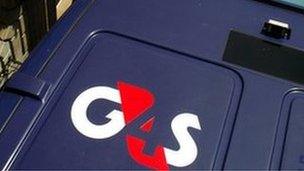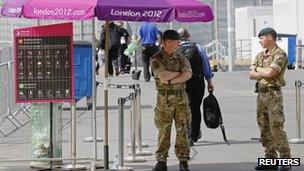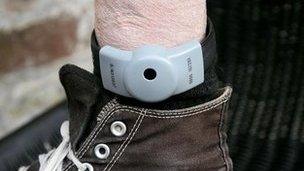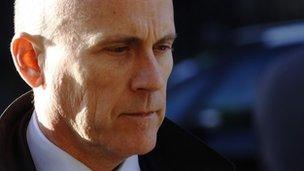G4S back in the spotlight
- Published

G4S works in 115 countries
"Securing Your World" is security company G4S's maxim. But increasingly it seems as if the company is failing to secure its own world.
The disturbances at Oakwood prison, which G4S has operated since last April, couldn't have come at a worst time for the company.
G4S has been struggling to restore its reputation since the summer of 2012, when it admitted it could not process applications quickly enough to provide the promised number of security personnel to the London Olympics.
In the year and a half since, it has suffered a series of embarrassing incidents, including an accusation that it overcharged the government for the electronic tagging of criminals, an abandoned £5.2bn bid for Danish cleaning company ISS after opposition from shareholders, and a profit warning.
The world's largest security firm, G4S makes its money from companies and governments outsourcing "businesses processes" - placing security staff where there aren't enough police, for example, or prison officers where those are lacking.

Soldiers were called in to cover for G4S security staff at Olympic venues
"We protect rock stars and sports stars, people and property, including some of the world's most important buildings and events," is how it presents its business - security made sexy, almost.
But in this kind of industry, reputation is important.
And Panmure Gordon analyst Michael Allen says while the issues at Oakwood prison are not significant financially, they could further hit the public perception of G4S.
"It chips away at sentiment, that is the concern," he told the BBC. "For it to win work, people need to trust that it can deliver."
Olympic debacle
G4S's failure to provide enough security guards for the London 2012 Olympics had already battered its reputation.
The resulting fallout saw it lose £88m on the contract, after thousands of troops and police had to be drafted in to guard the Games at the 11th hour.

Nick Buckles stepped down in May
A damning report from MPs concluded the firm was solely to blame for the fiasco.
Nick Buckles, the chief executive at the time, admitted the contract was a "humiliating shambles", but remained at the helm after an internal report absolved him personally of any wrongdoing.
However, last May Mr Buckles decided to step down after a warning of lower profit margins than expected for 2013 disappointed investors, and saw the shares fall 15% in just one day.
Mr Buckles was replaced by chief financial officer Ashley Almanza. A G4S spokesman said at the time that shareholders agreed the decision was "in the best interests of the company".
SFO probe
Since then G4S has issued new shares and sold off some divisions, leading it to state at the end of last year that it was now in a "significantly stronger financial position".
However, it is still awaiting the outcome of a Serious Fraud Office investigation.

G4S has been accused of overcharging the government for the electronic tagging of criminals
The official probe came after an audit suggested both G4S and rival Serco had been charging for tagging criminals who were either dead, in jail or never tagged in the first place.
The audit by accountancy firm PricewaterhouseCoopers alleged the two companies had overcharged the government by "tens of millions of pounds" on the contracts.
Ahead of the outcome, both firms have been stripped of responsibility for tagging criminals in the UK.
Mr Almanza told MPs G4S had failed to "tell the difference between right and wrong" when dealing with the contracts.
Fighting back
Just two months ago G4S said it was "well advanced" in its plans to restore the company's name, saying it had "renewed management, reinforced its corporate values and strengthened risk management and controls".

Ashley Almanza took the helm in June
In a period of just six months it has named a new chief executive, a new chief financial officer and a new regional chief executive for its UK businesses as well as created a new position of group head of risk.
Globally it is well diversified, with operations in more than 115 countries and more than 620,000 employees.
Its most recent results showed that its emerging-markets businesses, which account for more than 40% of group profits, continue to do well.
In the UK, more than 10,000 customers, including 59 FTSE 100 companies and the majority of UK government departments, depend on G4S to provide them with a safe and secure way to deliver their services.
These statistics suggest that the disturbances at HMP Oakwood are not important in the context of the several hundred contracts it manages.
"This is not something that moves the financial dial. But it is difficult to quantify the impact on the future," says Mr Allen.
- Published12 July 2012
- Published21 June 2012
- Published30 April 2012